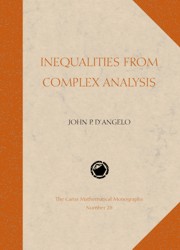
-
The digital format of this book is no longer available to purchase from Cambridge Core. Other formats may be available.
-
Select format
-
- Publisher:
- Mathematical Association of America
- Publication date:
- 26 October 2011
- 01 January 2002
- ISBN:
- 9780883859704
- 9780883850336
- Dimensions:
- Weight & Pages:
- 00kg,
- Dimensions:
- Weight & Pages:
- Subjects:
- Mathematics, Real and Complex Analysis
- Series:
- Carus Mathematical Monographs
You may already have access via personal or institutional login- Subjects:
- Mathematics, Real and Complex Analysis
- Series:
- Carus Mathematical Monographs
Book description
Inequalities from Complex Analysis is a careful, friendly exposition of inequalities and positivity conditions for various mathematical objects arising in complex analysis. The author begins by defining the complex number field, and then discusses enough mathematical analysis to reach recently published research on positivity conditions for functions of several complex variables. The development culminates in complete proofs of a stabilization theorem relating two natural positivity conditions for real-valued polynomials of several complex variables. The reader will also encounter the Bergman kernel function, Fourier series, Hermitian linear algebra, the spectral theorem for compact Hermitian operators, plurisubharmonic functions, and some delightful inequalities. Numerous examples, exercises, and discussions of geometric reasoning appear along the way. Undergraduate mathematics majors who have seen elementary real analysis can easily read the first five chapters of this book, and second year graduate students in mathematics can read the entire text. Some physicists and engineers may also find the topics and discussions useful. The inequalities and positivity conditions herein form the foundation for a small but beautiful part of complex analysis. John P. D'Angelo was the 1999 winner of the Bergman Prize; he was cited for several important contributions to complex analysis, including his work on degenerate Levi forms and points of finite type, as well as work, some joint with David Catlin, on positivity conditions in complex analysis
Reviews
The book is nicely organized and well written for readers who have a background in real analysis and complex variable theory. The book is carefully prepared...It will be a valuable resource for research libraries.
Richard Chechile Source: Journal of Mathematical Psychology
I really enjoyed reading this book....The first five chapters are accessible to the broad mathematical community with basic training in analysis and are useful for an honors course at the senior undergraduate level. The entire book offers an attractive but demanding introduction to modern complex analysis at the graduate level.
Jeffrey Nunemacher Source: MAA Online Reviews
This short book takes readers from the first properties of the complex numbers, all the way to current research. On the way, the readers will acquire essential tools from complex analysis, linear algebra, Hilbert space, several complex variables, Fourier analysis, and operator theory. Even more remarkably, the pace seems leisurely, with many delightful digressions, some nearly as interesting as the main results....such a book affords the undergraduate the pleasant opportunity to learn important basics by immediately seeing them fit together into something of beauty.
D. V. Felman Source: Choice
Contents
Metrics
Altmetric attention score
Full text views
Full text views help Loading metrics...
Loading metrics...
* Views captured on Cambridge Core between #date#. This data will be updated every 24 hours.
Usage data cannot currently be displayed.
Accessibility standard: Unknown
Why this information is here
This section outlines the accessibility features of this content - including support for screen readers, full keyboard navigation and high-contrast display options. This may not be relevant for you.
Accessibility Information
Accessibility compliance for the PDF of this book is currently unknown and may be updated in the future.


